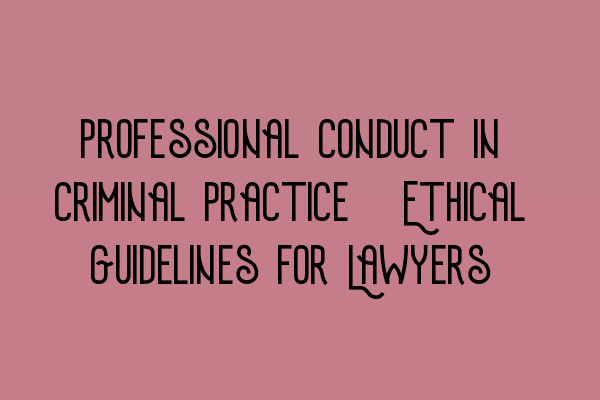Professional Conduct in Criminal Practice: Ethical Guidelines for Lawyers
When it comes to criminal practice, professional conduct and adherence to ethical guidelines are of utmost importance. As lawyers, we have a responsibility to uphold the standards of our profession and ensure that justice is served. In this blog post, we will discuss the ethical guidelines that every lawyer should follow in their criminal practice.
1. Confidentiality and Privilege
One of the fundamental principles of legal practice is maintaining client confidentiality. Lawyers must respect the attorney-client privilege and ensure that all client information remains confidential. This includes not disclosing any privileged information, even after the client-attorney relationship ends.
For more information on attorney-client privilege, refer to our article on SQE 1 Practice Exam Questions.
2. Conflict of Interest
Lawyers must avoid any conflicts of interest that may compromise their professional judgment. This means not representing clients whose interests conflict with each other and not engaging in any activities that may create a conflict of interest.
If you are unsure about the concept of conflicts of interest, our article on SQE 1 Practice Mocks FLK1 FLK2 provides a comprehensive explanation.
3. Honesty and Integrity
Lawyers must always act honestly and with integrity in their dealings with clients, the court, and other parties involved in the criminal justice system. This includes not misrepresenting facts, disclosing all relevant information, and maintaining the highest level of professionalism.
For tips on how to maintain honesty and integrity in your criminal practice, check out our article on SQE 2 Preparation Courses.
4. Competence and Continuing Professional Development
As lawyers, we have a duty to provide competent representation to our clients. This means staying up-to-date with the latest developments in criminal law and investing in our professional development. Lawyers should always strive to enhance their knowledge and skills through continuous learning and training.
If you’re interested in advancing your professional development, our article on SQE 1 Preparation Courses offers valuable insights.
5. Respect for the Rule of Law
Lawyers play a crucial role in upholding the rule of law. It is our duty to assist in the administration of justice and to respect the legal system. This means abiding by the rules and regulations set forth by the Solicitors Regulation Authority (SRA) and ensuring that our conduct promotes the principles of justice and fairness.
For more information on the SRA and the rules governing professional conduct, visit the SRA SQE Exam Dates page on our website.
By adhering to these ethical guidelines, lawyers can maintain the integrity of the legal profession and provide effective representation to their clients. Professional conduct is not just a requirement but a reflection of the values we hold as lawyers.
For any further questions or guidance on professional conduct in criminal practice, please do not hesitate to contact us.
